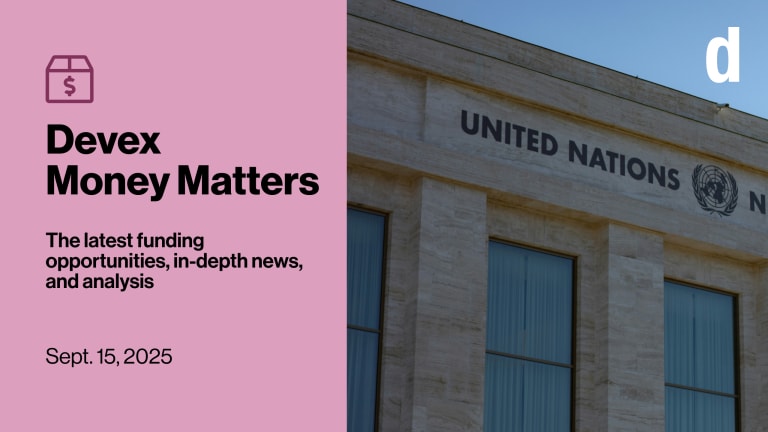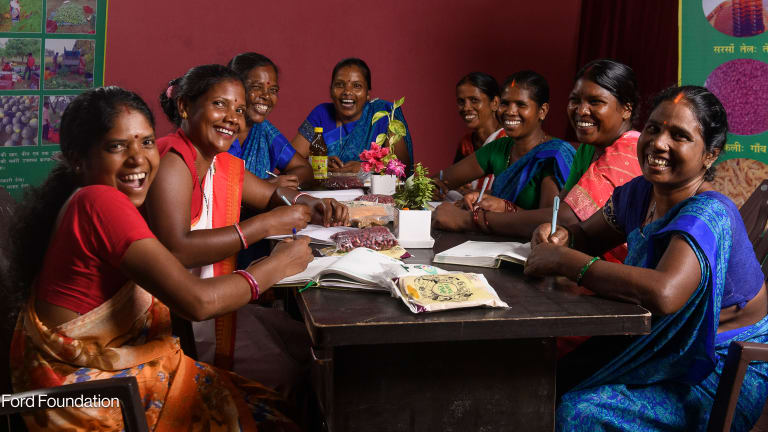
Development is no longer the exclusive mission of governments and aid groups, but a collective and collaborative effort from all members of society for it to be truly inclusive and sustainable.
The private sector and philanthropists are increasingly stepping in to fill the void left by the declining budgets of traditional donors, as noted in a recent report by the Asian Development Bank which noted that emerging and non-traditional donors are on the rise in Asia-Pacific region, where almost 60 percent of the population lives in poverty and hunger. And definitely a former beauty queen is about as non-traditional as donors go.
“Philanthropy begins with the basic premise of caring for the welfare of humanity; a principle that, I believe, should be inculcated in all our children,” Deborah Henry, Miss Universe Malaysia 2011, told Devex. “I see it as being every individual’s right and responsibility to invest in developing, nourishing, caring, empowering and providing opportunities to disadvantaged communities.”
Henry, 28 and included in Forbes’s list of top Asian philanthropists in 2013, used her success in beauty pageants to establish the Fugee School, which she co-founded five years ago for children refugees that end up in Malaysia. She firmly believes that philanthropy can significantly boost the global development agenda, especially now that traditional donors can’t give as much as they would want to.
Here are a few excerpts from our exclusive interview:
What led you to do development work?
I was always interested in poverty eradication as an idealistic teenager and felt greatly disturbed that millions of children would never break out of their difficult situations for lack of opportunities. I then went on to study Economics and Political Science, which further solidified my desire to work with disadvantaged communities for them to have more opportunities and platforms to break out of their crippling circumstances. At the Fugee School, our goal is to give these refugee kids that education and empower them with the skills plus internal strength and belief that they can go on to have the lives they wish for themselves.
How important is it for someone to be involved in philanthropy?
Philanthropy is a lofty word. To some extent it scares people, especially when it brings to mind the great works of Bill gates, Warren Buffet and so on. Philanthropy begins with the basic premise of caring for the welfare of humanity; a principle that, I believe, should be inculcated to all our children. While philanthropy tends to be long term “giving” on a bigger scale, I see it as being every individual’s right and responsibility to invest in developing, nourishing, caring, empowering and providing opportunities to disadvantaged communities.
There is a buzz now in the development community that CSR activities and philanthropy from private entities are the new emerging donors that can fill the void left by declining traditional donors. What should you, as part of the new emerging donors, do to make sure the programs you implement are aligned with development agenda?
It’s important to know if and how your initiatives fit in with the overall global development agenda. Why reinvent the wheel or work against the grain when you can pool resources and engage in smart partnerships?
New donors tend to have access to all the resources and know-how to merge appropriate business practices and techniques with guiding principles and values. At the Fugee School, we are continuously working on the balance of “head and heart” in making all our decisions and long-term targets. We don’t try to do it all. Instead, we partner with individuals or companies that have the expertise and skill sets we require. I always talk to people about donating their skills as it’s easy enough for them and more efficient for us.
How important is development in terms of doing philanthropic work?
The act of getting a child to attend and stay in school can break the cycle of poverty, child marriage, prostitution, violence and illicit activities and diseases. This can be a long-term sustainable solution [through] empowering individuals to improve their lives. The positive effects are generational and, to me, this is exactly what needs to happen.
As child rights advocate for World Vision Malaysia, I’ve been privileged to visit some of their projects in India, Myanmar and Lebanon. While their focus is on children, they recognize that in order to help a child you need to help their family, and to help a family you need to help the community. The approach has to be all-encompassing. Philanthropic work has the resources to look at development on this scale.
What are the challenges in doing development work through philanthropy?
The big challenge with any kind of development work is understanding what the host community wants. At the Fugee School, most of our hurdles have risen from premature assumptions about the community and from thinking we understand each other when both sides see things very differently. Cross-cultural differences and misunderstandings can be a reason for a project to fail, not lack of funding.
A common perception in the West is that giving to other people in Asia is not as important as giving to one’s family or clan. But now this seems to have changed with the rise of Asian philanthropy. Can you tell us more about the transition? What made the shift and how it changed Asian philanthropy to what it is now?
You are right, many Asian communities have been enjoying relatively new found wealth and prior to great economic growth in these countries, most subsisted on little so, I think, people are not comfortable with the idea of giving away so much so soon. In addition, the older generations’ mentality is “save for a rainy day” or “if and when” things go bad politically or economically — their past memories affects their present and future. Culturally, the family unit is very important and family always comes first. It is about image and “saving face” — one will never do something to jeopardize the family’s interests and public image. Some communities also operate on a “help your own kind” mentality and see things through a tinted lens.
However, I see a lot of changes in the way people give today. Younger generations, who are more global [in thinking], understand that as an interdependent and interconnected society, the improvement of living standards needs to happen across the board for all to thrive and while they enjoy spending, their emotional connection to money and materialism [should not] prevent them from being philanthropic. I see many companies run by younger generations embracing sustainable CSR initiatives, they think out of the box and embrace new ways of giving.
Any advice to people who are thinking of getting involved in development work and philanthropy? What are the steps on how to be engaged in the process?
With development work, it’s crucial to fully understand the issues of the communities one is engaging with. Spending time at the grassroots level and getting to know the people you’re helping [is key], as it’s easy to lose focus of the reality of the situation. Nothing is wrong with starting small, but always keep in mind the bigger picture.
Read more development aid news online, and subscribe to The Development Newswire to receive top international development headlines from the world’s leading donors, news sources and opinion leaders — emailed to you FREE every business day.








